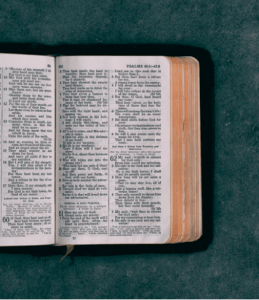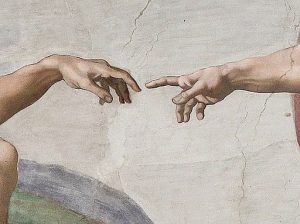by Lois Tverberg
How would the original audience of the Bible have understood the first chapters of Genesis? What meaning did they find in the creation accounts? Could it have been different than how modern Christians read the Bible?
 Our Western culture places a high value on scientific data, chronological order, abstract ideas and philosophical reasoning. In contrast, Eastern societies emphasize relationships and use stories and concrete physical images to describe reality.1 Because of this, we expect our Bibles to speak in sophisticated abstractions about eternity and the nature of God.
Our Western culture places a high value on scientific data, chronological order, abstract ideas and philosophical reasoning. In contrast, Eastern societies emphasize relationships and use stories and concrete physical images to describe reality.1 Because of this, we expect our Bibles to speak in sophisticated abstractions about eternity and the nature of God.
Old Testament stories about eating apples, building arks and talking to burning bushes seem silly and childish to us. Until we learn to grasp the Bible’s very different way of communicating, we’ll struggle to fully appreciate the profound meaning it relays in a different cultural language.
Nowhere is this more true than in the book of Genesis. When we focus only on the physical details, we completely miss the point. For instance, the flood account is often discussed in terms of its impact on geology. Completely forgotten are its profound ideas about the sinfulness of humanity and God’s response. We overlook the important theological statements about the universal corruption of man, and how through the covenant with Noah, God committed himself to find a way to redeem humankind rather than to condemn it.2 If you don’t realize that the biblical writers were explaining theology through story, you’ll miss the fact that the flood narrative actually points ahead toward the work of Christ.
What if we took another look at the creation account of Genesis 1, considering that it is a deeply Hebraic text? Let’s consider what would have been important and meaningful to listener of Abraham’s time.

In the beginning, God created the heavens and the earth.
How would Abraham have reacted to this first line of the Bible? It may surprise you that the account in the Bible was likely not the first story he would have heard about the creation of the world. Several myths are known from the Ancient Near East that circulated in his time.3
Most creation stories featured wars and relationships between human-like gods and goddesses. These myths taught that through sexual procreation, or by acts of violence and murder the creation was formed: the seas, the sky, the land. The gods were limited in power and intent on gaining dominance over the other gods, and the world was created as a product of their wars. Humans were created to serve as their slaves, to cater to their whims.4
The biblical account is utterly unique among the creation stories of its time. The revolutionary idea that all that exists was the handiwork of one vast, powerful God was almost unbelievable to polytheists, who imagined that many small gods reigned over the earth.
The idea that the creation was “very good” and that humankind was special to God was also completely unheard of. In pagan cultures, humankind was a minor afterthought of the gods, and humanity lived in fear of the capricious gods who cared nothing for them. It is important to realize how many foundational ideas are contained in this first chapter of the Bible, and how radical they would have been in their time.5
In Abraham’s world, it would have been obvious that the biblical creation account was deliberately contradicting the pagan myths that were widespread in that day. It would have shocked them to hear that the things that most people worshipped, like the sun and the moon, were simply inanimate objects that were created by the true God (Gen. 1:16).
Neither the sun or moon are even named, except to call them the “greater light” and “lesser light,” in order to hint at their insignificance. Similarly, magical sea monsters like the tannin (a large reptile) and leviathan were regarded as gods in many myths. Genesis specifically says that God made the tannin along with other animals of the sea (v. 21), thereby stripping it of its divinity. In this way, the Bible was “demythologizing” the world and teaching that there is only one God, creator of all things.6
What is not said in the creation account
Another contrast between the biblical creation account and other ancient stories is that the Bible makes not attempt to explain the origins of God. A goal of many creation myths was to tell the origins of the gods themselves, as an apologetic to convince people of their existence.
 In contrast, from the very first sentence of Genesis the reality of God is assumed. This awesome God simply felt no need to explain his own origins. This a prominent characteristic of God that we see throughout the Bible– that in his majesty he simply does not answer every question humans have.
In contrast, from the very first sentence of Genesis the reality of God is assumed. This awesome God simply felt no need to explain his own origins. This a prominent characteristic of God that we see throughout the Bible– that in his majesty he simply does not answer every question humans have.
We see this same characteristic later in God’s conversation with Job. Job asked God why he allows innocent people to suffer, and God didn’t give him an answer. Instead, he responds by asking him questions, and challenging him to explain the mysteries of creation: where the snow and hail come from, and how the foundations of the earth were laid (Job 38-40).
Through this response, God was showing Job that he could not answer his questions because the human mind simply cannot comprehend God’s reasoning. We forget that God created and designed everything: from neutrinos to bacteria to ecosystems to galaxies. As Isaiah 55:9 says, “As the heavens are higher than the earth, so are my ways higher than your ways and my thoughts than your thoughts.”
When God wanted to show Job something that is utterly beyond human understanding he chose the creation, with the assumption is that humans can never completely comprehend its design. This is good to keep in mind as we read Genesis: God’s infinite knowledge simply cannot be brought down into human terms.
The Grand Symmetry of Creation
The creation accounts in Genesis are an extreme simplification of God’s activity into statements that all of humanity could understand. For instance, it says that “man was created from the dust of the earth” but it says nothing about how God designed organs and tissues and cells. Other passages also employ poetic “telescoping” of God’s activity, like the phrase that says that God “brings forth bread from the earth” (Ps. 104:14). This doesn’t mean that bread loaves magically arise out of the soil, but that through a complex series of events, God causes grain to grow that we can harvest and make into bread.
Looking more in depth at the story of the first six days reveals amazing beauty and order in God’s creative activity. Most Christians are unaware of the symmetry of the design over the days, and the delightful imagery that the Hebrew words employ. At first the earth is formless and empty. The phrase “formless and empty” is very poetic in Hebrew: tohu va vohu. Interestingly, God addresses the “formlessness,” tohu, on the first three days by separating the various elements each day:
- Day 1: God separates light from dark, and creates day and night.
- Day 2: God separates the “waters above” from the “waters below” and creates sky and sea.
- Day 3: God separates the waters below from the dry areas and creates land and oceans. He also creates a garden.
Then, God addresses the “emptiness,” bohu, of creation by filling the domains created in the first three days.
- Day 4: God creates lights — the sun, moon and stars — to “fill” and reign over the day and the night (note that day and night were made on Day 1)
- Day 5: God creates birds to fill the skies, and sea creatures to fill the sea (both created on Day 2)
- Day 6: God creates land animals to fill the dry land, and he creates humans to live in the garden (created on Day 3).
Clearly, the structure of the days is meant to show the amazing orderliness and grand design of God.7 He first creates the space itself, names it, and then later fills it in an orderly manner.
The Message in the Creation Account
A key to understanding the creation account is to see that its goal is to explain the meaning of all things in God’s sight, rather than the mechanical way in which they were created. As Genesis 2:4 says, “These are the toledot (“begats,” generations) of the heavens and the earth: their being created.”8 In the same way genealogies are given to explain the relationships of people, the Genesis accounts are meant to explain the relationships between the parts of the creation.
One implication is that chronological order is not the point of the creation story. We can see this by comparing the account in Genesis 1 to the second story in Genesis 2, where everything is made in a different sequence. Humans are created first, then plants, and then animals (Gen. 2:4-20).
To us, it is a problem that the two accounts are not in the same order, but chronology was not an overriding concern in the ancient world.9 Even though the sequences and timing are different, both stories have the same extremely important conclusion — that humans are the pinnacle of God’s creation. We are unique in bearing the image of God and deriving our life from God himself.
In the Image of God
 It is hard to overemphasize the revolutionary impact of the idea that humans are made in the “image of God.” Human life is uniquely precious to God, and each person is infinitely valuable to him. This powerful idea was behind many humanitarian laws of the Torah compared to other law codes of the time.10
It is hard to overemphasize the revolutionary impact of the idea that humans are made in the “image of God.” Human life is uniquely precious to God, and each person is infinitely valuable to him. This powerful idea was behind many humanitarian laws of the Torah compared to other law codes of the time.10
Through the statement that “God created man from the dust and breathed the breath of life into him,” we can see the amazing paradox that unlike the rest of creation, we are the work of God’s own hands, yet unlike animals, we receive our spirit from God himself. We are as insignificant as dust, and yet we bear the imprint of God himself!
We can even see the basics of the Gospel in embryonic form in these first passages of Genesis. We see the power and majesty of the True God of the universe, his incredible creativity and infinite wisdom, and his elegant design of the cosmos.
More importantly, we see his great concern about life and what is good, and even more than that, his precious children, the human race. By understanding our enormous value in the eyes of God, we can see the reason why even when humanity falls into sin and rebels against him, he will go to amazing lengths to redeem us and bring us back to himself.
~~~~
1 For more on the differences between Eastern and Western thought, see Our Father Abraham: Jewish Roots of the Christian Faith by Marvin Wilson (Eerdmans, Grand Rapids, MI, 1989) pp. 135 – 160.
2 See the article “The Flood’s Deeper Message of Mercy.”
3 Nahum Sarna, Understanding Genesis (New York: Shocken Books, 1966), pp. 4-18. Note: Much of the article above is based on the first chapter of this classic book by Sarna, which is highly recommended for further study.
4 The idea of slavery to God or other gods comes up throughout the Bible, and shows the enormous difference between the true God and all others. See the article “Who Are You Going to Work For?“.
5 See Understanding Genesis, p. 18
6 Ibid, p. 9-10.
7 See the JPS Torah Commentary: Genesis by Nahum Sarna, (New York: Jewish Publication Society, 1989), p. 4.
8 See The Five Books of Moses by Everett Fox, (Schocken, New York, 1983) pp. 17. Also, see L. Rabinowitz, “Family,” Encyclopedia Judaica CD-ROM, Judaica Multimedia, Version 1.0, 1997 and Listening to the Language of the Bible, pp. 71-72.
9 Some books of the Old Testament were written out of chronological order because it just wasn’t a priority as we see it (Isaiah, Jeremiah and Ezekiel, for instance). This may also be why some of the stories of Jesus’ life are also in a different order in different gospels. See New Light on the Difficult Words of Jesus: Insights from His Jewish Context, by David Bivin, (En-Gedi, 2005) pp. 35-38.
10 See the En-Gedi article “Who Are You Going to Work For?” and also Exploring Exodus, by Nahum Sarna (New York: Shocken Books, 1986), p. 171-189.
Photos: Aaron Burden on Unsplash, Arto Marttinen on Unsplash, NASA on Unsplash, Leo Rivas on Unsplash
 Christians usually focus on the story of the physical creation when they read the first few chapters of Genesis. We miss the fact that these critical chapters are teaching revolutionary truths, which to us seem so basic we can hardly think in any other terms. Yet until Judaism and Christianity brought them to the world, they were not a part of mankind’s thinking. Not only are they important, they are wonderful news once you think about it!
Christians usually focus on the story of the physical creation when they read the first few chapters of Genesis. We miss the fact that these critical chapters are teaching revolutionary truths, which to us seem so basic we can hardly think in any other terms. Yet until Judaism and Christianity brought them to the world, they were not a part of mankind’s thinking. Not only are they important, they are wonderful news once you think about it!





